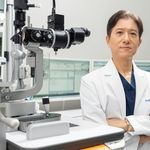








Pterygium surgery is a procedure to remove a pterygium, which is a non-cancerous growth of tissue on the conjunctiva (the thin, transparent membrane covering the white part of the eye). Here’s an overview of pterygium surgery:
Indications for Surgery:
Surgical Techniques:
Excision with Conjunctival Autograft:
Amniotic Membrane Transplant:
Other Techniques:
Recovery and Post-operative Care:
Risks and Complications:
Conclusion:
Pterygium surgery is effective in removing the growth and addressing associated symptoms or visual disturbances. The choice of surgical technique depends on the size and location of the pterygium, as well as the surgeon's preference. Regular follow-up care is essential to monitor healing and detect any signs of recurrence early.
What does Alpha Seoul Eye Clinic offer patients?
How many specialists are there and what accreditation's have been awarded to Alpha Seoul Eye Clinic?





Pterygium surgery is a procedure to remove a pterygium, which is a non-cancerous growth of tissue on the conjunctiva (the thin, transparent membrane covering the white part of the eye). Here’s an overview of pterygium surgery:
Indications for Surgery:
Surgical Techniques:
Excision with Conjunctival Autograft:
Amniotic Membrane Transplant:
Other Techniques:
Recovery and Post-operative Care:
Risks and Complications:
Conclusion:
Pterygium surgery is effective in removing the growth and addressing associated symptoms or visual disturbances. The choice of surgical technique depends on the size and location of the pterygium, as well as the surgeon's preference. Regular follow-up care is essential to monitor healing and detect any signs of recurrence early.
What does Alpha Seoul Eye Clinic offer patients?
How many specialists are there and what accreditation's have been awarded to Alpha Seoul Eye Clinic?
















Pterygium surgery is a procedure to remove a pterygium, which is a non-cancerous growth of tissue on the conjunctiva (the thin, transparent membrane covering the white part of the eye). Here’s an overview of pterygium surgery:
Indications for Surgery:
Surgical Techniques:
Excision with Conjunctival Autograft:
Amniotic Membrane Transplant:
Other Techniques:
Recovery and Post-operative Care:
Risks and Complications:
Conclusion:
Pterygium surgery is effective in removing the growth and addressing associated symptoms or visual disturbances. The choice of surgical technique depends on the size and location of the pterygium, as well as the surgeon's preference. Regular follow-up care is essential to monitor healing and detect any signs of recurrence early.
What does Alpha Seoul Eye Clinic offer patients?
How many specialists are there and what accreditation's have been awarded to Alpha Seoul Eye Clinic?
CONTACT SUCCESSFUL